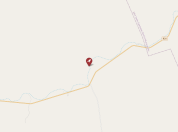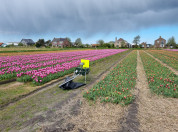Search
Filter by
Type
Tags
Dossiers
Themes
Departments
Active filters
1048 search results
Search results
-
Kuruman River Reserve
Metadata of the field study (KRR-1) at Kuruman River Reserve (KRR), South Africa
-
Associated Private Nature Reserves
Metadata of the field study (APN-1) at Associated Private Nature Reserves (APN), South Africa
-
Einar Martinez de la Parte
Postdoc
-
Five years as a director: a retrospective and a peek at the future
Until October last year, Geert de Snoo was at the helm of the Netherlands Institute of Ecology (NIOO-KNAW). A few months later, we look back with him on five years of directorship and talk about his new role as director of research policy at the Royal Netherlands Academy of Arts and Sciences (KNAW).
-
SPARKLES: Responsible Upscaling of Floating Solar
To meet the goals of the Dutch Climate Act, large-scale solar energy deployment is essential—but space is limited. Floating Photovoltaics (FPV) on inland waters offer a promising solution, yet their environmental impact remains poorly understood, and clear policies are lacking. SPARKLES bridges the gap between energy science, ecology, and governance to develop sustainable, nature-inclusive FPV solutions. Through interdisciplinary research and stakeholder collaboration, the project aims to balance renewable energy production with ecological and social benefits at local, regional, and national scales.
-
Living Lab B7
The aim of Living Lab B7 is best summarised as providing insights and KPI’s (critical performance indicators) to Greenport Duin- and Bollenstreek, Nationaal Park Hollandse Duinen and the Deltaplan Biodiversiteitsherstel to contribute to the practice of biodiversity recovery in rural areas on local, regional and national scales.
-
Do methane cycling microbes keep Arctic lakes in check?
How do microbes influence the methane release in the arctics? And how will climate change influence these microorganisms? These questions and more are what a new research project led by Suzanne McGowan of the Netherlands Institute of Ecology (NIOO-KNAW) will try to answer.
-
Climate proof soils by steering soil and residue microbiomes to improve the physical, chemical and microbial properties of compost with clay
This research is part of the ClipsMicro (Climate proof soils by steering soil and residue microbiomes) project and aims to make Maize cultivation on sandy Dutch soils more sustainable and resilient by designing and testing a climate proof soils management strategy. We integrate cover crops with biological nitrification inhibition (WP 3) and clay-amended compost (WP 2). Here you can contribute to WP 2, focusing on the clay-amended compost research. -
Extreme climate pushed thousands of lakes in West Greenland 'across a tipping point'
West Greenland is home to tens of thousands of blue lakes that provide residents drinking water and sequester carbon from the atmosphere. Yet after two months of record heat and precipitation in fall 2022, an estimated 7,500 lakes turned brown, began emitting carbon and decreased in water quality, according to a new study NIOO is involved in.
-
NIOO reunion
On 26 June we will celebrate the end of NIOO's Lustrum: 70 years of ecology. And a new year to come! We will do this together with NIOO staff, students and alumni.
